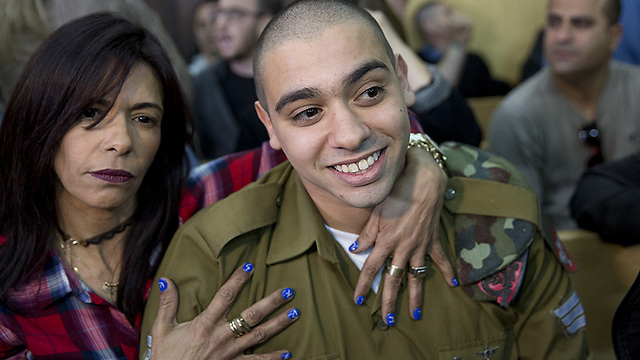Op-ed: As a child, Elor Azaria was a victim of the education he received at home and of his political opinions. As a soldier, he was a victim of his service in Hebron. As a culprit, he was a victim of his advisors.
It’s not Elor Azaria who should have been put on trial, it’s all the leaders of the Jewish settlement in Hebron throughout the years. The trial should not have focused on morality in battle, but on the morality of their presence there. Some 900 settlers and yeshiva students have placed themselves among 250,000 Palestinians. Most of them are not preaching good neighborly relations and peace, they are agitators calling for a transfer.
The IDF has hundreds of soldiers in Hebron. A soldier for every three settlers. Today, there are mainly conscript soldiers there. In the past, the army stationed reserve soldiers there. Year after year, on the day they were discharged, the reservists would write a letter to the chief of staff, informing him that they were no longer willing serve in Hebron. During the day, they suffered abuse. During the night, they were attacked with stones, dirty diapers and turpentine.
The late Rabbi Moshe Levinger, the founder of the Jewish settlement in Hebron, was prosecuted several times for unruly behavior against both Arabs and Jews. He curses, threatens and even physically attacks the soldiers who are watching over him—his own bodyguards—the court ruled.

After the Baruch Goldstein massacre at the Cave of the Patriarchs, then-prime minister Yitzhak Rabin considered evacuating them. The shock and astonishment opened the door to evacuation. Legally, it would have been simple and easy: Canceling the expropriation orders for “military purposes,” under which the settlers are present there. The government did not lack legal cause, just a bit of courage. Instead of evacuating them, a long curfew was imposed on the surrounding Arab neighborhoods.
As a child, Elor Azaria was a victim of the education he received at home and of his political views. It’s enough to take a look at the Facebook posts that his father, his mother and he himself wrote even before the incident: “Kahane was right,” “Kill them all,” “Hit them where it hurts.” As a soldier, Elor Azaria was a victim of the service in Hebron. As a culprit, Elor Azaria was a victim of his advisors, who drove him away from the argument that “the terrorist deserved to die because he stabbed my friend,” made a U-turn towards an imaginary self-defense claim, and then reversed to a claim that the terrorist had already been dead.
While the initial investigation was taking place, then-Defense Minister Moshe Ya’alon and Chief of Staff Gadi Eisenkot issued a statement condemning Azaria’s act. The explanation was that the purpose of the condemnation was to prevent an escalation and revenge attacks. But the operational explanation clashed with the legal correctness, and mainly with the presumption of innocence. As soon as a decision is made to investigate, and there is a possibility of prosecution—silence should fall on both sides. The defense minister went as far as to say that the rules of engagement would not be determined by gang leaders. Do we want an army that has become brutal, he asked, an army that has lost its moral backbone?
One of Azaria’s defense witnesses was the civilian security chief for Hebron’s Jewish settlers, Eliyahu Libman. In his wild and dubious testimony, he lashed out insolently at the army and its commanders. Libman holds a personal merit certificate from the chief of staff. Ya’alon is the chief of staff who gave it to him. During his service as Central Command chief, Ya’alon was enchanted by the settlers’ pioneering magic. They reminded him of the guys from Kibbutz Grofit. He didn’t realize that he was riding a tiger, just like later on he wouldn’t understand the essence of the disengagement from Gaza, and then the need to realign in the West Bank, and finally the Likud DNA.
When a soldier arrives in Hebron, the local leadership expropriates the IDF authority, throws out the organizational envelope and digs its hoofs into him. From this moment and as long as he serves in Hebron, extreme right-wing politician Baruch Marzel is his prime minister, Libman is his chief of staff and Ofer Ohana of Magen David Adom is his direct commander.
The judges delivered their verdict after thorough and accurate work. The sentence is lenient but reasonable, weighing all the personal and general circumstances, as well as the spirit of the time and place. A judge, including a military judge, has neither a wallet nor a sword. All he has is the public’s trust. The trial must be careful not to draw too further away from the public, and the public, unfortunately, fails to distinguish between a living, dying or dead terrorist.
In my opinion, the judges could have deceived the masses, outsmarted them even more and not sent Azaria to prison at all. Rather, they could have demoted him to the rank of private and thrown him out of the IDF with a mark of disgrace.
As reported by Ynetnews
